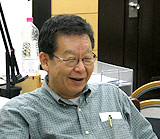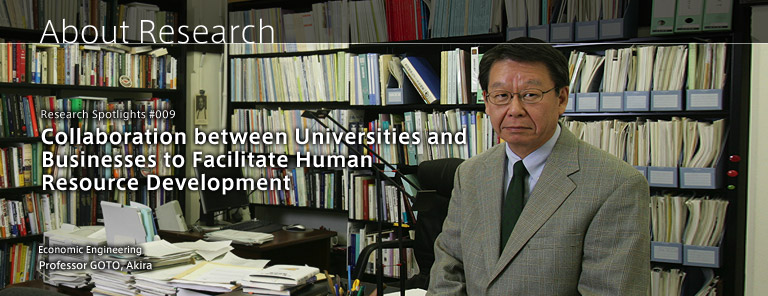The importance of human resources in science and technology has been called into question in recent years. The Japanese government's Third Science and Technology Basic Plan (2006-2010) takes up "the fostering and securing excellent researchers" as one of its main topics. Furthermore, recent incidents of researchers filing suit against companies for "reasonable remuneration" for their "invention in service" has drawn national attention to treatment of researchers.
The serious supply-demand mismatch of human resources in science and technology
43% of 2003 doctorates of science and 36.4% of doctorates of engineering are unemployed (Gakko kihon hokokusho?(Basic Report on Schools), Ministry of Education, Culture, Sports, Science and Technology). Contrary to the government's hopes for human development in science and technology, the truth is that there are very few avenues available in society for utilizing Ph.D. graduates. Businesses maintain that it is difficult to utilize personnel with Ph.D.s because they specialized in a specific field, instead tending towards hiring master's students and training them in-house. Over 70% of Ph.D. graduates aspire to attain positions at universities and public institutions rather than at companies. If this kind of mismatch continues, there will no longer be opportunities for high-caliber human resources to make full use of their abilities. This is a misfortunate situation particularly for young researchers and a total waste for Japan as a whole.
Shoring up the educational infrastructure at graduate schools
In order to resolve this mismatch of supply and demand, the climate and education of graduate schools must be further enhanced as students work towards obtaining doctorate degrees. For example, one strategy for universities is to implement curriculum which fosters researchers capable of taking a leadership role in a wide range of situations at universities and businesses, etc. RCAST's "Program for Developing Advanced Human Resources (PPP Education, or proposal, presentation, performance)," which aims to develop human resources capable of taking a leadership position, is an illustration of this. Meanwhile, it is also important to set up opportunities for postdoctoral researchers (post-doc) to fully utilize their abilities. In the United States, students enrolled in Ph.D. programs, as well as post-docs, conduct research while receiving a salary. By gaining experience such as this, post-docs can continue to thrive as independent researchers.
Are researchers underprivileged?
The main topic of concern with the issue of invention in service was that researchers felt they were not treated well enough at companies. It is unclear how this mindset developed, but it is keenly felt among researchers that human resources in the sciences are underprivileged as compared to those in humanities.
Collaboration with businesses

-
Considering these circumstances, I would like businesses to make a concerted effort towards university education and contribute to human resource development in science and technology research. Maintaining the technological foundation at universities, which is closely associated with businesses, would be advantageous not only for universities but for companies as well. In terms of education, businesses in other countries establish extensive collaborative partnerships with universities and are actively involved with human resource development. Under the guidance of universities and businesses in Britain, graduate students benefit from the Knowledge Transfer Partnership (KTP) system, where they work on specific topics while receiving a salary. Furthermore, businesses also offer financial assistance to students working towards their doctoral degrees, while universities and companies collaborate to offer guidance under the Collaborative Awards in Science and Engineering (CASE) program. These are good mechanisms for promoting human resource development with problem-solving skills as well as knowledge transfer from universities. Using these types of systems as paradigms, I feel that Japan also would benefit from putting in place a framework for serious cooperation between universities and businesses to facilitate human resources development.
References:Kagaku, vol. 6 (Iwanami Shoten)
Interviewer:Tamane Ozeki
(July 4, 2006)


